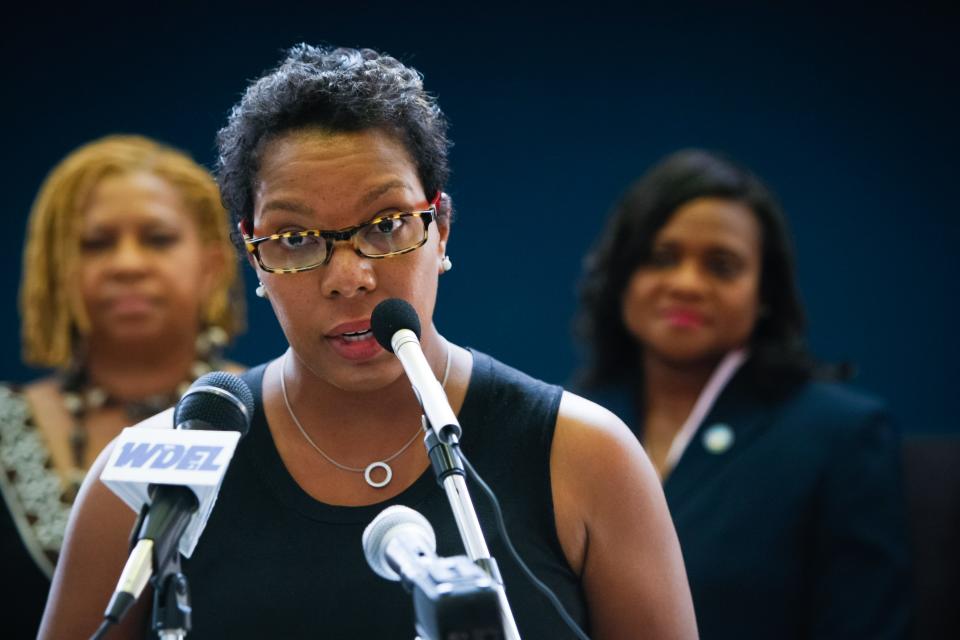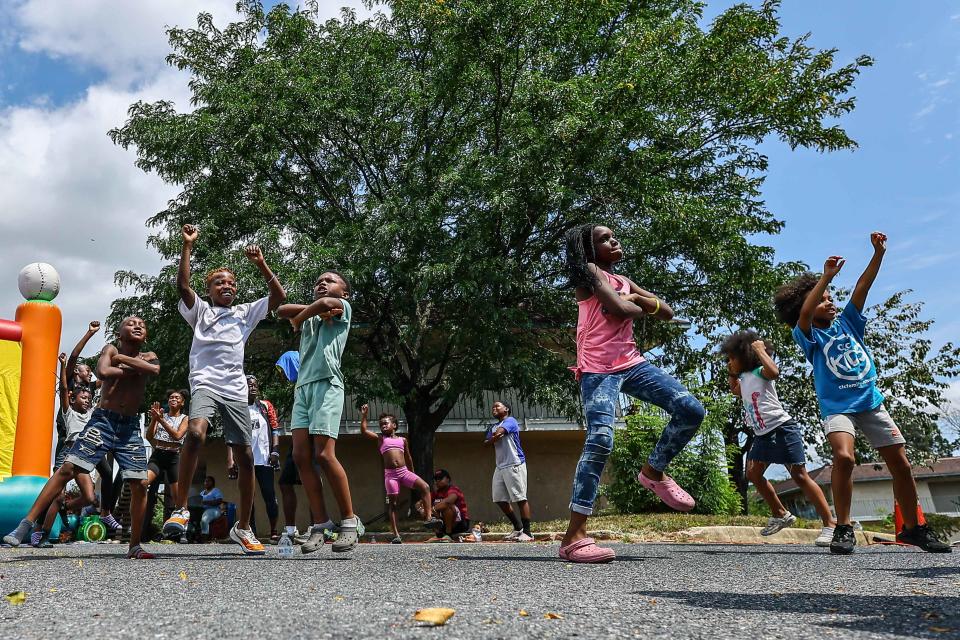ACLU points to one Delaware charter school to spotlight lessons in inclusive culture
She’d tell anyone walking inside to expect a sea of vibrant blue uniforms and bright smiles. Young jaguars are greeted with handshakes or high-fives each morning, before filing into routines for the school day ahead.
Rachel Valentin knows every day isn’t easy, but she says building culture is a chief focus for her Charter School of New Castle.
Another Delaware organization has taken notice.
The ACLU of Delaware’s Equity in Education Campaign released a report this month highlighting the Charter School of New Castle’s approaches to addressing discipline disparities among Black and brown students — specifically those with disabilities — who are suspended and expelled at significantly higher rates than their white counterparts.
This inclusive school model, anchored in “restorative” practices over punitive measures, carried three pillars: cultivating school culture, increasing student engagement and bolstering channels for parent engagement.
Through collaboration with ACLU-DE, since a 2021 partnership, the school deepened its work through new programs and professional development. Now, it’s seeing significant reduction in suspensions.
“Non-punitive, restorative discipline practices support the development of responsive relationships for young people with adults and foster students’ development of core life skills, including self-regulation,” said Melva Ware, ACLU-DE consultant for curriculum development and evaluation and primary author of the report, in a statement.
“It’s time for Delaware educators to follow CSNC’s model by learning and adopting systematic approaches that encourage problem-solving and create opportunities for students to take responsibility for their behavior and learn new, better behavioral patterns.”

Opinion: When it comes to Delaware students’ success, we have to take decisive action
Delaware's Department of Education calls restorative processes those that "proactively build healthy relationships and a sense of community within the classroom to prevent and address conflict and wrongdoing," in its discipline best practices. The tool is growing in use over suspensions, it says, often looking more closely at root causes of misbehavior.
The Education Department provides links for educators to learn more about restorative practices and trauma-informed teaching, as previously reported by Delaware Online/The News Journal, but there is no required statewide training on either subject.
Sixty-nine percent of all out-of-school suspensions in Delaware are for minor issues, according to ACLU-DE. Black students — especially boys — are two to three times more likely to receive a suspension. Black students with disabilities are suspended or expelled at twice the rates of white and Latino counterparts.
“Student discipline is a racial justice issue,” said Shannon Griffin, senior policy advocate at ACLU-DE. “Implicit biases against Black and brown children cause them to experience harsher discipline. Furthermore, many kids who experience high discipline rates have disabilities or histories of poverty, abuse or neglect, and would benefit from additional educational and counseling services.”
Nearly 87% of the Charter School of New Castle’s students identify as African American.
The building’s in-school suspension rate is less than 2%, while traditional K-7 or K-8 schools in Delaware have rates above 10%. Out-of-school suspension rates are at 8.5%, while traditional schools of this age group see rates ranging from 12.5% to 19%. The K-8 school has about 825 students.
ACLU-DE dug into this and more in its October report. An event sharing more details on the inclusive school model is set for 6 p.m. on Thursday, Nov. 2, as a virtual discussion.
"The key lies in investing in training educators, school staff, parents and community members in restorative discipline practices that keep students in classrooms rather than pushing them out," Griffin wrote in a recent column. "CSNC encourages problem-solving and creates opportunities for students to take more responsibility for their own behavior, leading to better education outcomes and a path of civic engagement that can last far beyond their grade school years."
The data: Some Delaware students are suspended far more than others. How schools are addressing this
Striving for inclusive culture from elementary to middle school

Rachel Valentin came to the charter school in 2015.
She now leads the elementary as its executive director, while fellow educator LaRetha Odumosu came in just a few months later to begin leading the middle school under the same title. It didn’t take long to see they wanted to make changes.
“I knew immediately that it was important for us to identify something that students could say yes to,” Valentin said. “There needed to be a clear program, a clear school culture. And so that was really the birth of the combination of the positive behavior system and bringing in strong school systems — and marrying those two together.”
Hopes for a positive behavioral tool would soon evolve into the “Jag System,” a schoolwide intervention program that encourages students to earn points for positive behavior, elect corrective behavior, cash out points or participate in frequently scheduled events to celebrate scores.
The structure differs slightly for younger and older learners, but typically students automatically qualify for Jag events. Only bad behavior could push them out, until the process resets. This program meets other efforts that hope to see students feel they belong.
“We have the actual suspension data that's gone down over the years,” Odumosu said. “But anecdotally, as students have done something that might have resulted in a suspension, their first response is, ‘I don't want to be suspended.’ They want to be in the school environment. Students want to come and feel the social belonging. They feel celebrated.”
Strong systems also meant focusing on the behavior of the adults who respond in and out of school.
With ACLU-DE support, the school welcomed Akoben LLC — a professional development resource facilitating training in relationship-building as foundational to fair discipline, per ACLU-DE's report — to lead some 12 hours of training on “Developing Restorative School Culture.”
An average of 97% of faculty attended the sessions.
“I think that those things contributed to what you're essentially seeing with the lower suspension rates,” Valentin said. “Because the teachers, one, have the passion for the work, but we're also providing the tools and the resources.”
Too many kids, not enough child care: Delaware families facing job woes amid shortages
Engagement from school, to home, and to come

It starts after that first high-five before 8 a.m.
Student engagement takes many shapes at Charter School of New Castle — from morning meetings for character building, to “Engaged for Action” service programs planned and executed by students, or simply peer-to-peer mentoring opportunities.
“You're developing yourself as an authentic human being because you are one,” Valentin said. “And we need to recognize that in the school environment that's important as well.”
Engaging at home was another cornerstone of the report. The school created a CSNC Parent Advisory Committee, meeting monthly to increase participation in academic planning, school climate, advocacy and more.
ACLU-DE said the school is “clearly a model for positive climate and exceptional leadership."
But it also noted areas for growth, as restrictions in the access of state funding inhibit the expansion to provide more rigorous curriculum and early learning. School leaders aim to overcome that, and ACLU-DE hopes to see this overall model spread in the First State.
Education: Delaware will choose its 2024 Teacher of the Year this month. Who's up for the honor?
In August, the Milford Board of Education voted to remove restorative practices from its code of conduct for all grades. Experts and advocates for the practice have cautioned it can take time to build up the sense of community that forms the backbone of the discipline method, as previously reported by Delaware Online/The News Journal.
These leaders say it just starts with a mindset.
“There's a mindset piece that needs to be in place for a restorative environment,” Odumosu said. “If folks are thinking about starting and don't start with the system, start with the mindset. Once people have the mindset of creating another sort of environment, the system flows out of that.”
Her building has been tuning its processes for just under a decade.
“That would be my encouragement: Just start somewhere. It doesn't have to be this big, overarching system. Just start with something small and build from there."
Got a story? Kelly Powers covers race, culture and equity for Delaware Online and USA TODAY Network Northeast, with a focus on education. Contact her at kepowers@gannett.com or (231) 622-2191, and follow her on Twitter @kpowers01.
This article originally appeared on Delaware News Journal: ACLU-DE highlights one school's lessons in inclusive school culture

